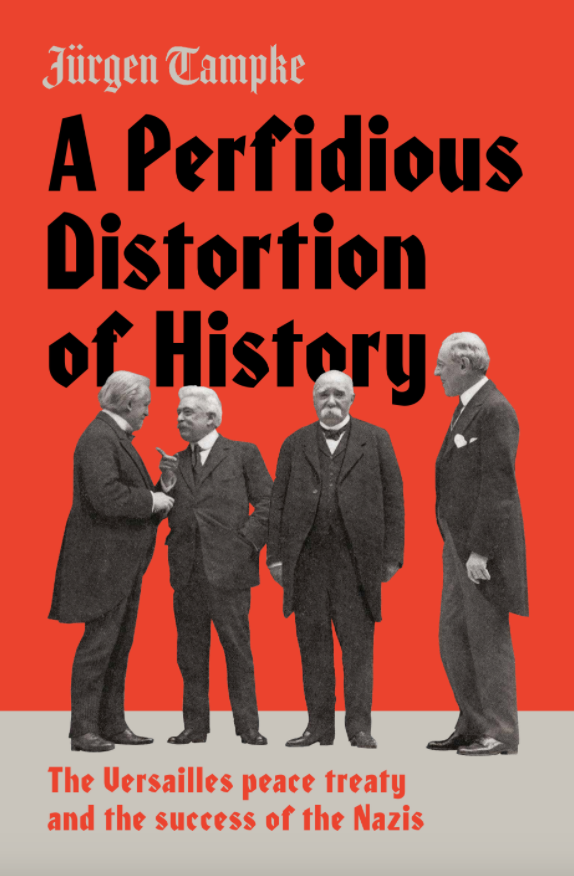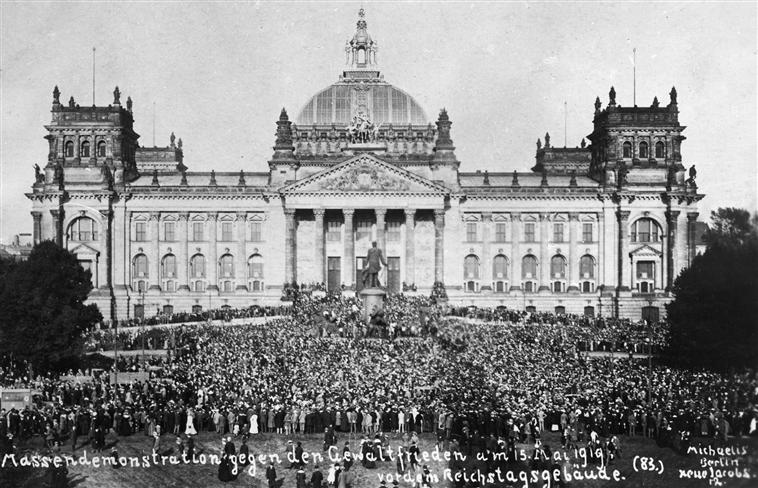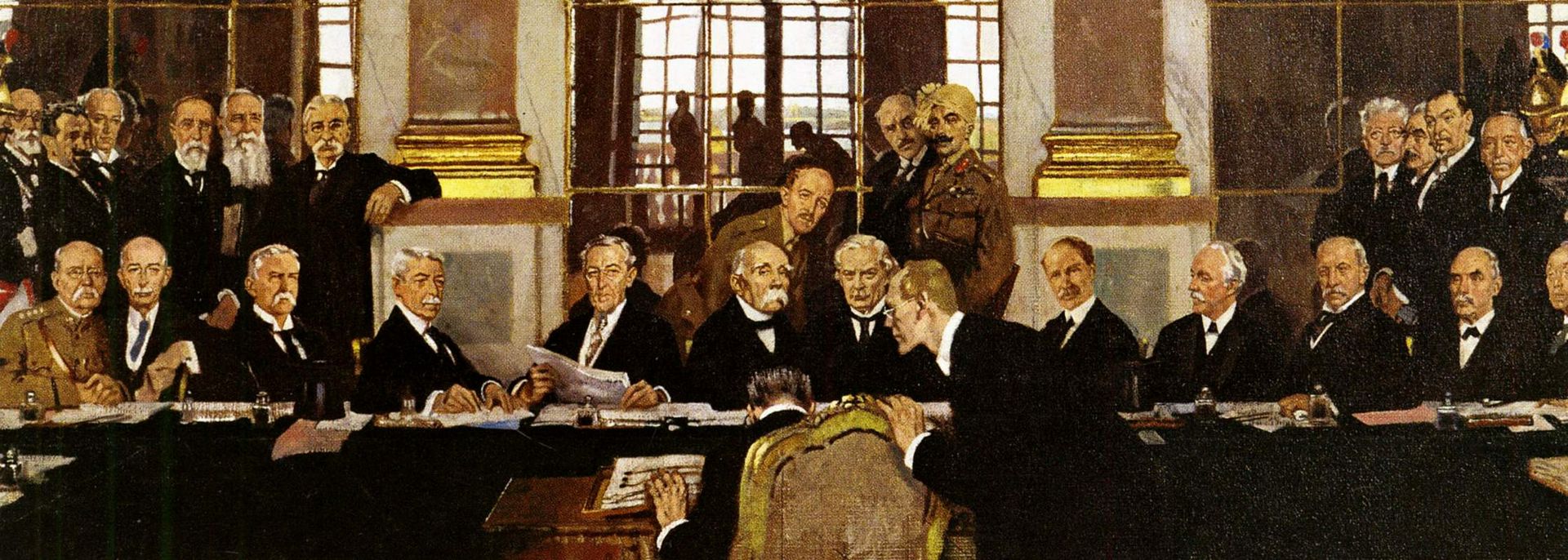The campaign for the United Kingdom’s exit from the European Union and Donald Trump’s Presidential election campaign have provided the public with a feast of ‘alternative facts’, fake news and manipulated data. That this path might eventually lead to fatal consequences is illustrated by an event rapidly approaching its centenary – the signing by Germany of the Peace Treaty of Versailles on 28 June 1919.
The German Empire, having imposed a Carthaginian Peace on the new Bolshevik government of Russia in March 1918, winning virtual control of eastern and south-eastern Europe, had overextended its resources. A last German attempt to break the stalemate in the West failed abysmally, and when the Allies’ counter-offensives of August and September 1918 broke through the trenches and the Hindenburg Line the German war effort went into free fall. The Reich’s military leadership instructed the government to seek peace, and this it did on the basis of the ‘Fourteen Points’ that had been put forward by American President Woodrow Wilson on 8 January 1918.
The Allies, after intense and often acrimonious debate among themselves, agreed to conduct peace negotiations on the basis of the Fourteen Points and the further condition ‘that compensation will be made by Germany for all the damage done to the civilian population of the allies and their properties by the aggression of Germany by land, by sea and from the air’.

Peace negotiations, which commenced in Paris on 18 January 1919, lasted for five months. The Germans were presented with the Treaty in the dining room of the Trianon Palace Hotel at Versailles on 7 May. The allies had included in the 440 articles of the Treaty a clause – Article 231 – stating Germany’s moral and legal obligation to accept responsibility for the damage inflicted on civilians by its aggression. Having assigned unlimited German theoretical and moral responsibility, however, Germany’s liability in practical terms, as contained in Article 232 of the Treaty, was much narrower. Nevertheless the German chief negotiator, Count Ulrich von Brockdorff-Rantzau, the physical epitome of the stereotypical Prussian aristocrat and just as arrogant, used the opportunity to produce what today we would call ‘fake news’ – or what traditionally went under the term ‘manipulation of documents’.
Having been handed the Treaty he immediately announced that Article 231 assigned war guilt to Germany, something he vehemently denied. So began the litany of ‘fake news’ surrounding the Versailles Peace. The newly formed German government in Berlin soon joined the chorus of news falsifiers, claiming that the Allies were imposing a ‘hunger blockade’ upon Germany threatening hundreds of thousands of children with starvation. In fact, though the Allies and the Germans did quarrel about the delivery of food, there was no such blockade. There certainly was undernourishment among the population at large, not just among children, but this was the result not of a ‘hunger blockade’ but of the German war leaders’ food distribution policy over the preceding four years, favouring as it did the soldiers at the front at the expense of civilians, whose food rations throughout the war were kept barely above subsistence level.

The ink on the Treaty was scarcely dry when English economist John Maynard Keynes provided his ‘alternative fact’ account. In his much-cited The Economic Consequences of the Peace Keynes, whose sympathies for the Germans were matched by his dislike of the French, predicted a disastrous economic future for Europe. Ten years after the war had ended none of his dire prognostications had come to pass; in fact the European economy had largely recovered. This changed with the collapse of the New York stock market in September 1929. Germany in particular sank into total economic chaos, but not due to the Versailles Peace; it was because the German budget had been financed with United States loans.
To establish that the ‘war guilt’ article was based on a falsehood became an integral part of Weimar Germany’s historical and political thought-process. Obviously if the Treaty was grounded in the assumption that Germany had caused the war, proving that assumption wrong would remove the very foundations of the Treaty itself. Not that Germany’s attempts to invalidate the war guilt article were crowned with much success. The publication of 40 volumes of diplomatic documents under the pretentious title Die Grosse Politik der Europäischen Kabinette (The major policies of the European Governments) failed to establish war responsibility. A further investigation commissioned by the Reichstag did indeed show that the Austro-Hungarian and German Empires had led Europe into the war, but the study was duly shelved by the German Foreign Office before it was discovered twenty years after the World War II by American scholars.

At the same time all problems the Weimar Republic faced were blamed upon the Treaty: economic problems, political problems, social problems, low wages, high unemployment, inflation. But Clio is not lightly deceived, and those who disregard her admonitions soon face the consequences. These came with devastating speed, when on 30 January 1933 Adolf Hitler took over the Reich.
After World War II the Nazi catastrophe had to be explained. Again the 1919 Peace Treaty obliged: ‘The War that led to the Versailles Peace that led to Hitler’ became the catchcry. And the claim that this peace stood at the root of all of the evil that befell the 20th century is still as alive today as it was almost a century ago. It is plain that no lessons have been learnt from the historiography of the Versailles Peace: fake news and alternative facts still abound. And governments today still attempt to take control of the narrative of history as they always have done.
Jürgen Tampke’s A Perfidious Distortion of History: The Versailles Peace Treaty and the Success of the Nazis is available now from Scribe UK. For more on World War I and World War II, subscribe to History of War and save 25% off the cover price.
